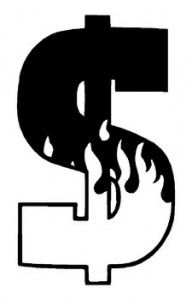 Physicians spend 12% of their net revenue to cover administrative waste in the course of practicing medicine over a year. Simplifying payment and billing through a universal form would save doctors in the U.S. $7 billion (yes, “billion” with a “b”).
Physicians spend 12% of their net revenue to cover administrative waste in the course of practicing medicine over a year. Simplifying payment and billing through a universal form would save doctors in the U.S. $7 billion (yes, “billion” with a “b”).
This sad story of waste is detailed in a Web First article on the Health Affairs website titled, Saving Billions of Dollars – And Physicians’ Time — By Streamlining Billing Practices. The research comes from a team from Massachusetts General Hospital, and includes the institution’s CFO — to whom $7 billion is surely ‘real’ money.
The authors point out that the Patient Protection and Affordable Care Act of 2010 (that is, the health reform bill passed by Congress) includes plans to adopt standards for the electronic exchange of health information by 2013, which will presumably drive paper out of the health system. But this version of health reform itself won’t be a panacea, the authors warn, as there aren’t the “teeth” in the bill that establishes firm guidelines for moving the information around.
The group from Mass General turned the mirror inside to study a provider organization dealing with many payers, each with their own requierments for billing and reimbursement. The organization they studied is recognized as a “high performance” group that has achieved an excellent record among its peers for managing accounts receivable, net collections, and relatively low cost per claims.
But even in this high-standard, bench-marked organization, the bottom line was that administrative complexity cost 12% of patient revenue. The largest component of this burden is the time costs incurred by practicing physicians and their staffs to prepare paperwork and communicate with payers about prescription drugs, diagnoses, treatment plans, and referrals.
Health Populi’s Hot Points: “The growth in administrative complexity has been largely overlooked as an opportunity for health reform,” the authors write. The U.S. Health Efficiency Index project, with which I am affiliated, has identified at least $30 billion of administrative waste in the U.S. health system, including but not limited to the billing and payment functions described in the Health Affairs paper.
The stakes of administrative waste in health care are national, and they’re shared among multiple stakeholders: payers, providers, employers, and most assuredly, citizens in at least two of their guises — as health citizen-consumers, and as taxpayers.
The more light that is shone on this wasteful situation, the more all stakeholders will decry it and move to resolve such an unsustainable business process. The authors have done a wonderful service to get the word out in this very persuasive case study.
Check out the study’s details, and take a look, too, at the first report of the U.S. Health Efficiency Index to learn more about administrative waste in the U.S. health system and what the nation can do to conserve $30 billion. As we say in the report, that’s real health reform.




 I love sharing perspectives on what's shaping the future of health care, and appreciate the opportunity to be collaborating once again with Duke Corporate Education and a global client on 6th May. We'll be addressing some key pillars to consider in scenario planning such as growing consumerism in health care, technology (from AI to telehealth), climate change, and trust -- the key enabler for health engagement or dis-engagement and mis-information. I'm grateful to be affiliated with the corporate education provider
I love sharing perspectives on what's shaping the future of health care, and appreciate the opportunity to be collaborating once again with Duke Corporate Education and a global client on 6th May. We'll be addressing some key pillars to consider in scenario planning such as growing consumerism in health care, technology (from AI to telehealth), climate change, and trust -- the key enabler for health engagement or dis-engagement and mis-information. I'm grateful to be affiliated with the corporate education provider  Thank you FeedSpot for
Thank you FeedSpot for